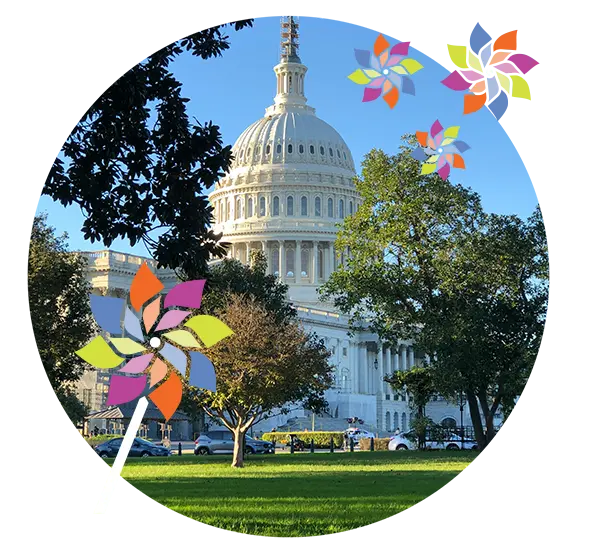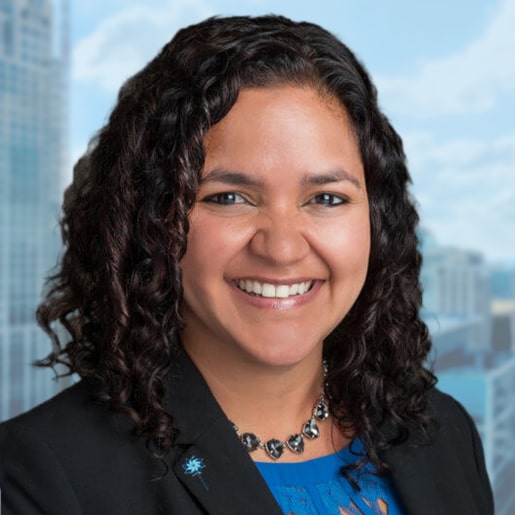Public Policy and Advocacy
Prevent Child Abuse America (PCA America) works at the national level to increase support for federal policies that advance the mission of creating a comprehensive primary prevention ecosystem.
The policy department also provides technical support at the state level to help facilitate effective advocacy through PCA America’s nationwide networks – its state chapter network and nearly 600 Healthy Families America (HFA) evidence-based home visiting program sites. When communities, policymakers, and resources are invested in comprehensive primary prevention, we can begin to envision a world where the negative impacts and outcomes from child maltreatment will be nonexistent.
Policy Options to Support Kids and Families and Reduce the Risk of Child Abuse and Neglect

Investments in Primary Prevention
Funding federal programmatic efforts such as Community Based Child Abuse Prevention grants and Preventing Adverse Childhood Experiences allows states and communities to implement efforts tailored to the needs of their families.

Comprehensive Family Supports
Programs such as early childhood home visiting and family resource centers serve as gateways for families to access important supports, stabilize crises, and promote positive physical, mental, and behavioral health.

Economic Stability and Mobility
Policies such as childcare subsidies, paid family leave, and child tax credits reduce the stressors of poverty that can overload families, promote safe and nurturing family environments, and ultimately build more prosperous communities.
Federal Policy Spotlight

Federal Policy Priorities
All children and families deserve to live a purposeful and happy life with hope for the future. A child’s early experiences impact them throughout life – both positively and negatively. When families face an overload of stress, it can hamper their ability to provide the supportive relationships and environments children need to prosper. When families have what they need, when they need it, without stigma, children can thrive. To learn more about PCA America’s priorities for supporting children and families, click below:
Federal Fiscal Year 2025 Appropriations Priorities
PCA America advocates for policies and services that strengthen families and communities, promote healthy child development, and prevent child abuse and neglect before it occurs. This includes advocating for investments in children that sets them up thrive through the federal appropriation process. Each year the President submits a budget to Congress for the federal government for the fiscal year (October 1 through September 30). Congress must then pass appropriations bills to provide money to carry out government programs for that year. PCA America makes recommendations for increases in fiscal year 2025 (FY25) Appropriations that includes the highest funding possible to support investments which result in significant and positive outcomes and safe, stable, and nurturing relationships and environments for all children. These federal supports are proven to prevent child maltreatment and ensure children reach their full health and life potential. Our FY25 priorities include increased investment for the Community-Based Child Abuse Prevention (CBCAP) program, child sexual abuse prevention, and adverse childhood experiences.
State Policy Spotlight

State Policy Priorities
State laws play a critical role in promoting healthy families, positive childhood experiences, and preventing child abuse and neglect. There are a range of legislative policy options to support families and reduce the stressors that can overload families. State investments in primary prevention can expand access to the resources, opportunities, and relationships children and families need to thrive. To learn more about PCA America’s priorities State Policy Priorities, click the link below:
Government Affairs Initiative
The Government Affairs Initiative (GAI), launched in 2019, is a strategic effort to increase the policy and government affairs capacity of PCA America’s state chapter network. The GAI provides policy support through direct technical assistance, guidance, and consultation, with the goal of growing internal capacity and expanding or leveraging the network’s presence at the state and federal level to affect change.
To date, almost all state chapters have participated in the GAI, receiving support and technical assistance from the PCA America policy department and advancing policy related efforts identified during their engagement. This year the GAI is focusing on building advocacy capacity and strategy of the chapter network through advancing one focused set of policy options to strengthen family financial security and mobility.
Economic Supports as a Prevention Strategy
Economic supports to families, such as state tax credits, living wages, and paid family and medical leave, are critical policy strategies in the prevention of child abuse and neglect. These policies help break down barriers to family success and address long-standing racial disparities and structural inequalities, including persistent poverty. Financial insecurity is a common source of parental stress, which in turn leads to greater likelihood of child maltreatment. Supports to families in times of need, particularly economic supports, are critical policies to support the prevention of child abuse and neglect. Over the last 10 years, a considerable decline has occurred in the reported number of children experiencing sexual and physical abuse, but cases of neglect have remained steady. Economic supports for families can be used individually or collectively as a policy strategy in the prevention of child abuse and neglect.
Engage in Advocacy and Be a Change Agent
You can influence policy. Advocacy happens in many different ways, but at its core advocacy is about raising awareness, building and leveraging relationships, and educating others around the issues and policies that matter to you.
Policymakers want to hear about the issues that concern their constituents the most and welcome your feedback. To advocate for children and families in your community, you can contact your legislators to let them know you support policies and programs that promote healthy child development and prevent child abuse and neglect before it happens.



